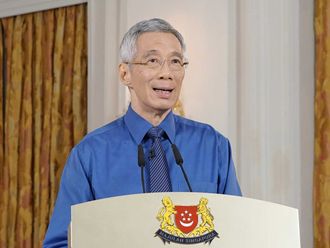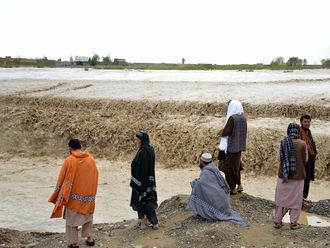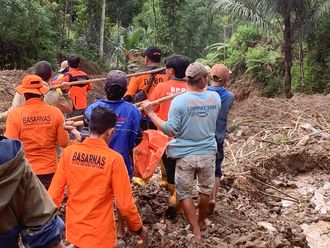Mangragadi, Nepal: Narayan Tharu, 56, was harvesting sugar cane the day the soldiers took his son away.
Twelve years ago, when news first spread that the boy, Tirtha, 17, had been detained on suspicion of being a Maoist, Tharu was hunched over in a field, where he worked as a bonded labourer. By the time a neighbour reached him in the afternoon, villagers had discovered articles of his son’s clothing flung up in a tree. At dusk, a naked body, dead and buried up to the neck, was found under a bridge.
“His head was not buried,” Tharu said of the episode in this village in western Nepal. “The whole body had been buried, but his head was only covered with leaves, so that people could see who it was.”
Last year, Tharu joined thousands of others in filing a formal grievance with the country’s Truth and Reconciliation Commission, formed in 2015 to investigate war crimes committed during Nepal’s Maoist rebellion, which lasted from 1996 to 2006 and claimed nearly 18,000 lives.
Thousands of complaints
More than 58,000 complaints have been collected against members of the army and political parties documenting cases of torture, rape and murder.
But with the first phase of the investigations still delayed, and their two-year mandate set to expire next month, many are convinced the commission is nothing more than an elaborate mechanism for sweeping history under the rug.
Reinforcing these suspicions are provisions, in the act creating the commission that grant amnesty to offenders, withdraw cases from Nepal’s Supreme Court and violate international laws governing the prosecution of war crimes.
Though members of the commission expect the government to extend their tenure by at least a year, rights advocates say they expect that legal actions against war criminals will continue to stall and that few prosecutions will materialise. In the years since the war ended, only one verdict has been reached.
“It has become clear that no political party, including the Maoists, were ever committed to the idea of delivering on justice and accountability for victims,” said Tejshree Thapa, a researcher with Human Rights Watch, which released a statement this month on the peace process. “There is absolutely no political will.”
The beginning of the Maoist movement in Nepal can be traced to 1949, with the formation of the country’s first Communist party. In the 1960s, while Nepal was ruled by an absolute monarchy, young men and women looked increasingly to ideas circulated during the Cultural Revolution in China and the Naxalite movement in India. Communism emerged as the way to uproot the monarchy and achieve total state control through an armed uprising.
The movement remained relatively obscure until the 1990s, when a radicalised section of the Maoists began to organise. Guided by Nepal’s current prime minister, Pushpa Kamal Dahal — who goes by his nom de guerre, Prachanda, or “the fierce one” in Nepali — the war officially began in 1996 and ended with a peace deal in 2006.
In an interview, Surya Kiran Gurung, the chairman of the Truth and Reconciliation Commission, defended the work of his office.
Cataloguing the challenges his staff has faced over the last two years, Gurung said there was no law in Nepal that criminalised torture, making prosecution tricky, and a short statute of limitations on reporting sexual violence. And money has always been a hurdle, he said.
“What I have been asking from the government is to give us the budget that we need,” Gurung said, noting that the commission has yet to hire investigators outside Kathmandu, the capital. “I’m here to take up my responsibility. I’m not here for a job.”
Devi Sunuwar, whose 15-year-old daughter, Maina, was captured by the army in 2004, tortured with the live wire of a water heater and eventually killed, scoffed when asked if the Truth and Reconciliation Commission had been working on behalf of victims. The commission is so underfunded, she said, it can barely afford refreshments at events organised for victims.
“All they offer is black tea,” she said tartly.
She said Nepal’s political leadership, including the Maoist party, had no interest in settling past grievances. Last year, she and members of a victims’ collective visited Dahal to present a memorandum of demands. The meeting did not go well, she said.
“The way he talked to us sent a very negative message,” she said. “He said those who earn in dollars,” the non-governmental organisations, “they’re provoking victims to speak up. In the villages, they will slowly forget, and only the clever ones in Kathmandu will continue fighting. Eventually, they too will forget.”
The prime minister’s office did not respond to multiple requests for an interview.
In the days after his son’s death, Tharu said, he tried to recover the body for a cremation ceremony, only to discover that it had been transferred to a Maoist military camp that he was not permitted to visit.
Months later, he would learn that his son had been buried in an unmarked plot. Years later, when the government promised victims about $4,500 (Dh16,527) in compensation, Tharu said, the first instalment of the payment, around $900, was pocketed by a district-level government employee.












